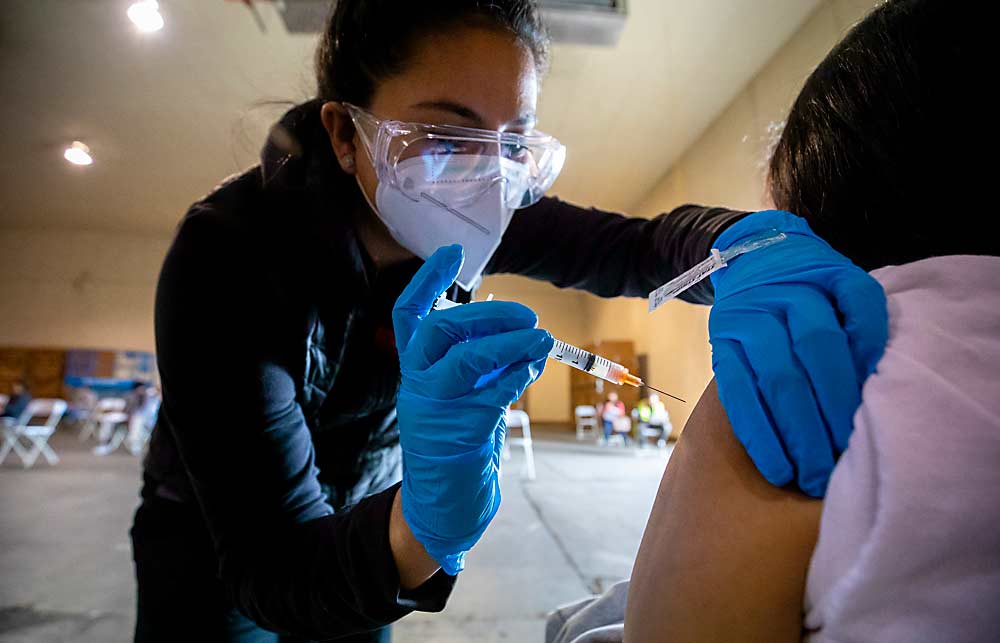
Eric Hansen initially balked at the idea of hosting an on-site vaccination clinic for his workers. The logistics sounded too complicated.
But the owner and CEO of Hansen Fruit in Yakima, Washington, came around and worked with the nearby Yakima Valley Farm Workers Clinic to vaccinate 125 of his employees on-site in early April.
“The flip side is, the more people we have vaccinated, the healthier they are going to be, and they’ll show up every day,” he said. He even offered paid time off for the time they spent getting a vaccination and a $100 bonus as incentive. Nearby fellow packer Allan Bros. sent about 100 of its employees over for vaccinations, too.
Hansen Fruit and Allan Bros. weren’t alone. As vaccine supplies expanded this spring, many states opened eligibility to essential workers, including those in agriculture and then to the general population. Many fruit production companies, large and small, went above and beyond to secure shots for their employees, working with pharmacies that have federal supplies, taking workers to clinics set up by the Federal Emergency Management Agency, making appointments at local clinics, offering incentives or bringing the needles to the workplace for on-the-job shots.
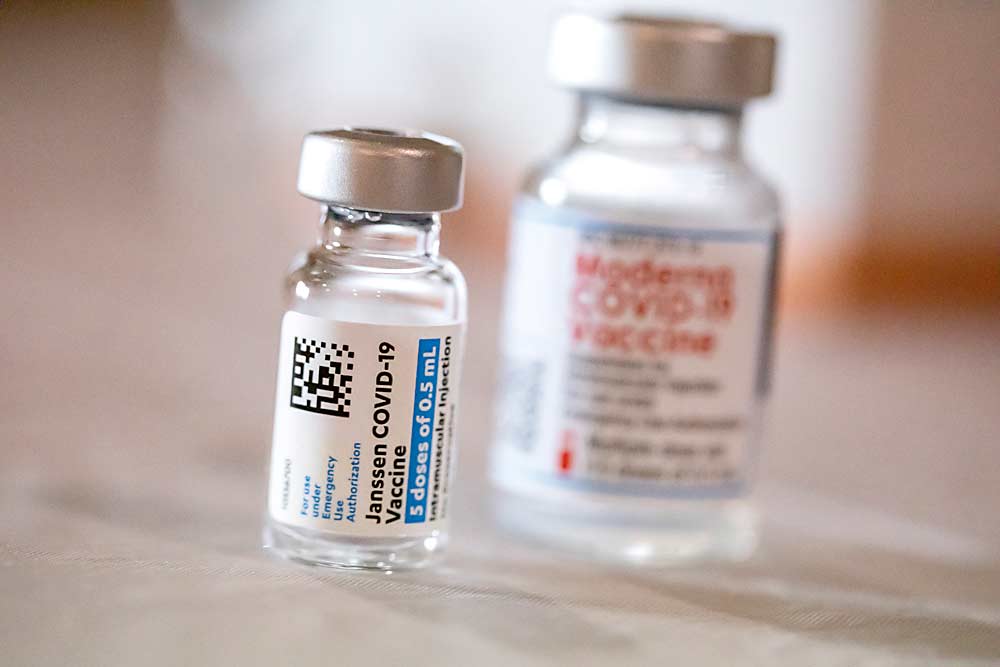
Those efforts will continue as H-2A workers continue to arrive for peak seasonal employment.
Watching out for worker health is the right thing to do, but it also makes business sense, said Dan Plath, co-owner of Washington Fruit and Produce Co. of Yakima.
“There’s an obvious benefit operationally and therefore financially to keep our workforce healthy and productive and working,” he said.
In mid-April, Washington Fruit, one of the state’s largest fruit companies, set up a three-day mass vaccination clinic at its Yakima packing facility, with a capacity for 600 people per day — though managers expected fewer than that, Plath said. They partnered with AnovaWorks, an occupational medical provider that operates a clinic on company property in Royal City, Washington.
Earlier in the spring, Washington Fruit bused dozens of employees per day to rural clinics, such as Columbia Basin Health Association in Othello. In fact, Plath received his shot there, too. More than 95 percent of H-2A workers have agreed to vaccinations, he said. He was unsure of the rate for domestic workers, but figured it would be lower.
Some companies have offered incentives, from extra time off to cash bonuses, to encourage their workers to accept the shots, either on-site or at an appointment.
“We gave them 2 hours of paid time off and $100, but it’s a hassle to sign yourself up and find an appointment,” said Kristin Kershaw Snapp, director of corporate affairs for Domex Superfresh Growers of Naches, Washington. “It makes it a lot easier to bring the clinic to them.”
She credits her HR team for working with YVFWC to set up an on-site vaccination event for 350 workers in late March. Demand exceeded supply, so the company intended to hold more clinics as more employees arrive for the season.
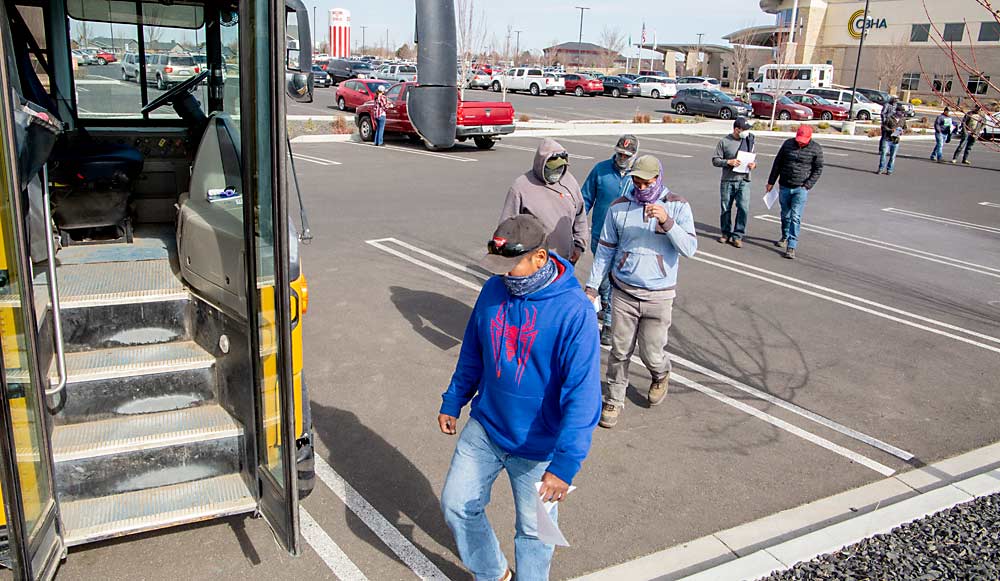
Par for the course
The vaccination efforts don’t surprise Jon DeVaney, president of the Washington State Tree Fruit Association. Employers have been concerned about worker safety from the beginning of the pandemic, he said.
“There’s always been an interest in protecting the workforce,” DeVaney said.
When asked in late March, DeVaney had not heard of any employers mandating vaccines, although in December the Equal Employment Opportunity Commission announced that companies could do so.
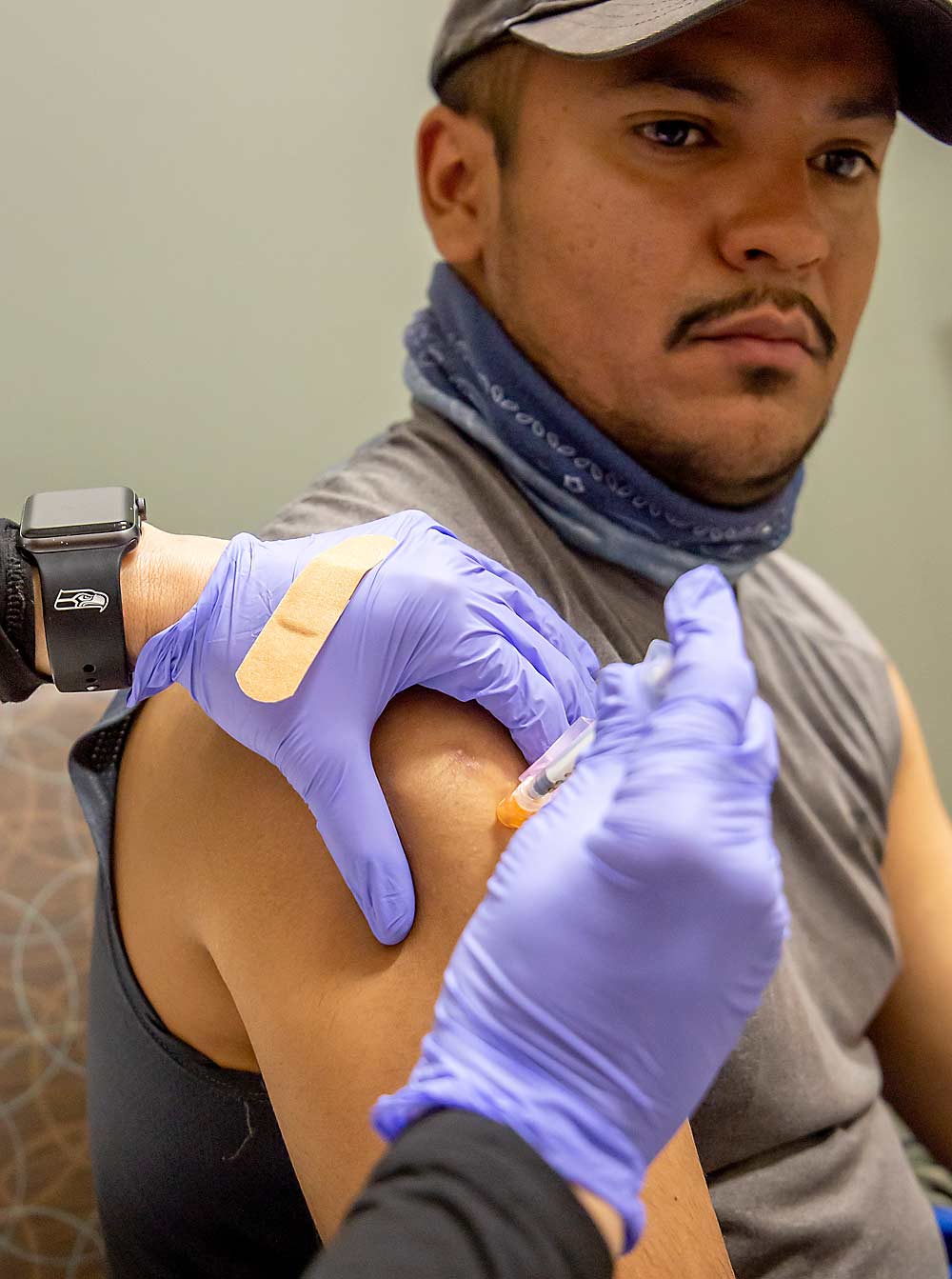
DeVaney urged all agricultural employers to do what they can to get as many workers vaccinated as possible. It will help bring the overall case count down in their communities and should eventually lead to opportunities to normalize their operations, though that likely won’t happen overnight, he said.
“It’s not like switching a light off; it’s more like a dimmer,” he said.
State health and workplace safety officials told DeVaney they intend to take vaccinations into account when it comes time to extend the emergency rules, he said.
“We’ve heard those concerns and ideas expressed,” said Tim Church, a Washington State Department of Labor and Industries spokesman.
In May last year, Labor and Industries issued emergency rules that cut labor transportation capacity in half and restricted the use of bunk beds to groups of 15 or fewer workers who live, work and travel together as a cohort. The regulations have been extended a few times, with the pandemic wearing on, each time with some changes. The current iteration expires in May and the agency expects to extend them again, Church said, though it’s hard to predict how they may change this time.
“There have been changes throughout this process, just like there have been changes throughout the pandemic,” Church said.
Testing upon arrival
In March in Washington, few — if any — H-2A workers arrived from their home countries already vaccinated, said Dan Fazio, CEO of wafla, a nonprofit farm labor association based in Lacey, Washington, but they did show up with extremely low infection rates. Workers were tested in their home countries by employers and visa processing companies, while the Washington State Department of Health partnered with nonprofit Medical Teams International to test the contracted laborers when they reached their U.S. farms.
Vaccinations, however, were left to individuals, employers and local providers.
Wafla recommends companies urge incoming H-2A workers to accept vaccinations, but not to mandate them. The organization also suggests companies holding on-site events open them to the public and allow an outside organization, such as the medical provider, to ask employees health-related questions, to avoid the perception of privacy intrusions. That advice came from attorneys and representatives with the Equal Employment Opportunity Commission, Fazio said.
Even with the vaccination efforts, Fazio suspects the Washington fruit industry will see COVID-19 outbreaks as unvaccinated workers travel from other parts of the U.S. for cherry harvest.
“We feel pretty strongly that there will be an outbreak in June … if there is no plan to vaccinate domestic seasonal migrant workers,” he said.
Hansen Fruit of Yakima plans to continue vaccination efforts.
Some of the company’s workers received the Moderna vaccine in early April, which means they need a second dose at a scheduled event in early May.
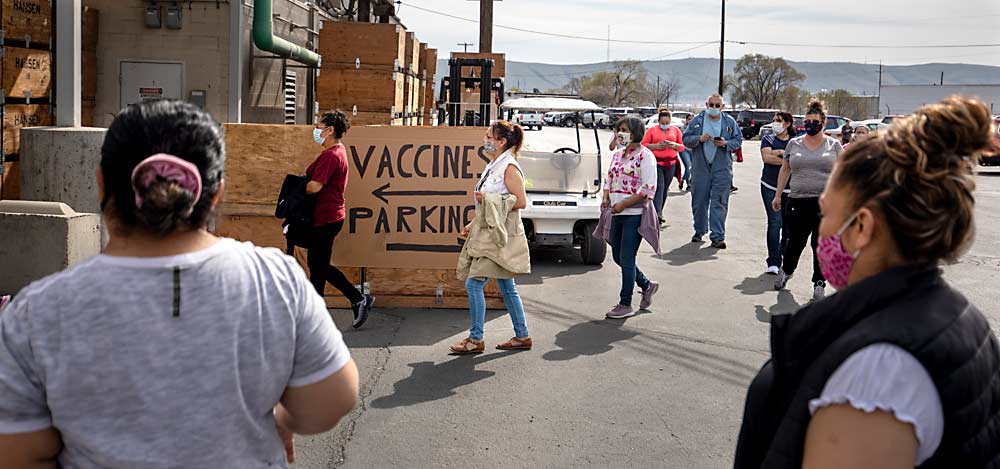
Meanwhile, Hansen planned to work with the clinic to coordinate vaccinations of orchard employees in 13 different locations around Eastern Washington, either by holding more on-site events or busing them to rural medical offices. He will do the same when his H-2A employees arrive in June.
He hopes the vaccines will usher in a return to routine work life, he said. Many of his vaccinated employees are excited to finally use the lunchrooms again for the first time in more than a year, a gathering allowed for vaccinated people under guidelines the Centers for Disease Control and Prevention released this spring.
“It will make their world a little more normal,” he said.
Hansen’s advice for other employers considering vaccination efforts is to “trust the process” and partner with a professional health organization such as the Yakima Valley Farm Workers Clinic.
“It did go way better than I anticipated,” Hansen said. “Smoother, faster.” •
—by Ross Courtney
Vaccination resources
The Washington State Tree Fruit Association is urging all industry employers to contact a local health district, clinic, pharmacy or federal provider to offer and encourage employee vaccinations for COVID-19.
Washington health authorities have the resources to arrange on-site vaccination events or schedule group appointments at clinics or the federal vaccination site at Yakima State Fair Park. Oregon growers also have a variety of community organizations and health authorities helping to vaccinate agricultural workers.
Good Fruit Grower has collected several related documents and links for both states at goodfruit.com/worker-vaccination-resources.

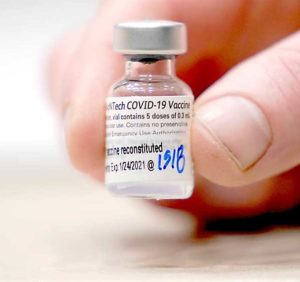





Leave A Comment